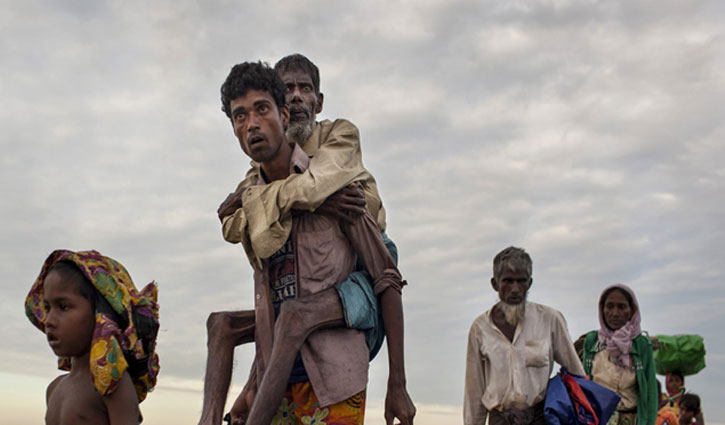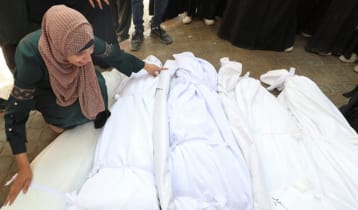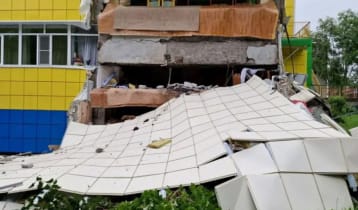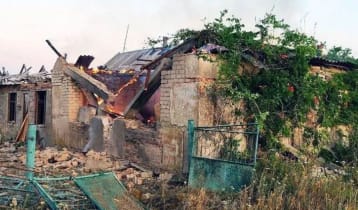‘Myanmar attacks on Rohingya were premeditated’
2 || risingbd.com

International Desk: The Tatmadaw operation launched in Rakhine State after attacks by Islamic militants last August followed “systematic preparations for mass atrocities against Rohingya civilians”, a human rights group has alleged.
Fortify Rights makes the allegation in a 160-page report released on July 19, They gave them long swords: Preparations for genocide and crimes against humanity against Rohingya Muslims in Rakhine State, Myanmar.
The report names 22 members of the Tatmadaw and the Myanmar Police Force whom Fortify Rights says “should be investigated for genocide and crimes against humanity against Rohingya in Rakhine”.
The list includes Tatmadaw Commander-in-Chief Senior General Min Aung Hlaing, Minister of Home Affairs Lieutenant-General Kyaw Swe, and MPF chief Police Major General Aung Win Oo.
Fortify Rights says the “dominant narrative accepted internationally” about what occurred in northern Rakhine last year is that the attacks by Rohingya militants instigated a spontaneous Tatmadaw-led crackdown that resulted in nearly 700,000 Muslims fleeing to Bangladesh.
“This report documents and reveals a sinister subplot: Myanmar authorities made extensive and systematic preparations for the commission of mass atrocity crimes against indigenous Rohingya civilians during the weeks and months before Rohingya-militant attacks on August 25, 2017,” Fortify Rights says in the report.
It says the preparations began after a first round of attacks by Rohingya militants on security posts in northern Rakhine on October 9, 2016, which led to a Tatmadaw operation that displaced more than 94,000 civilians.
Fortify Rights says that as part of the preparations, Rohingya civilians were systematically “disarmed” by confiscating household items that might be used as weapons and fencing and other structures around their homes were demolished to provide the military with greater line-of-sight.
It said that non-Rohingya communities in northern Rakhine were armed and trained, humanitarian aid to the region was suspended, “systematically weakening the civilian population and removing monitors on the ground”, a Muslim-only curfew was enforced and thousands of non-Rohingya evacuated from the area, and an “unusually sizable military presence, incommensurate with the threats at hand” was built up.
“Taken together, these measures demonstrate a level of preparation not previously documented with respect to the Myanmar Army-led ‘clearance operations’ in northern Rakhine State in 2016 and 2017,” the report says.
“All of these measures fall within the United Nations Framework for Analysis of Atrocity Crimes for identifying ‘preparatory action’ for genocide and crimes against humanity.”
The report says that for the International Criminal Court to issue an arrest warrant, the court must have jurisdiction and the prosecutor must find “reasonable grounds” that perpetrators committed genocide and/or crimes against humanity.
“The evidence collected by Fortify Rights demonstrates reasonable grounds to believe that the Myanmar Army, Police, and civilian perpetrators acted with genocidal intent to destroy the Rohingya in whole and in part,” it says.
“There are also reasonable grounds to believe that perpetrators in Myanmar committed crimes against humanity against Rohingya”, including murder, extermination, deportation or forced transfer, imprisonment, torture, rape, persecution, and enforced disappearance.
Frontier was unable to reach government and military spokespeople for comment on the report.
The report says the Arakan Rohingya Salvation Army, which planned the coordinated attacks on August 25 last year, had also perpetrated human rights abuses, including the murder of Rohingya civilians.
Fortify Rights says the international community failed to act after the Tatmadaw killed, raped, tortured and forcibly displaced Rohingya civilians in northern Rakhine in October and November 2016.
“That inaction effectively paved the way for genocide, providing the Myanmar authorities with an enabling environment to make deeper preparations for more mass atrocity crimes,” the report says.
“Domestic remedies in Myanmar have been exhausted. The government of Myanmar has consistently denied allegations of human rights violations in Rakhine State and failed to properly investigate and prosecute perpetrators.”
Fortify Rights says urgent action is needed from the international community. Its recommendations include calling on the UN Security Council to refer “the situation in Myanmar” to the International Criminal Court, impose a global arms embargo on Myanmar and sanction the individuals responsible for atrocities against Rohingya and others.
It also calls on UN member states to support the creation of a new UN mechanism to collect and preserve evidence of crimes to be used for future prosecutions.
Source: Agencies
risingbd/Dhaka/July 19, 2018/A K Azad
risingbd.com



















